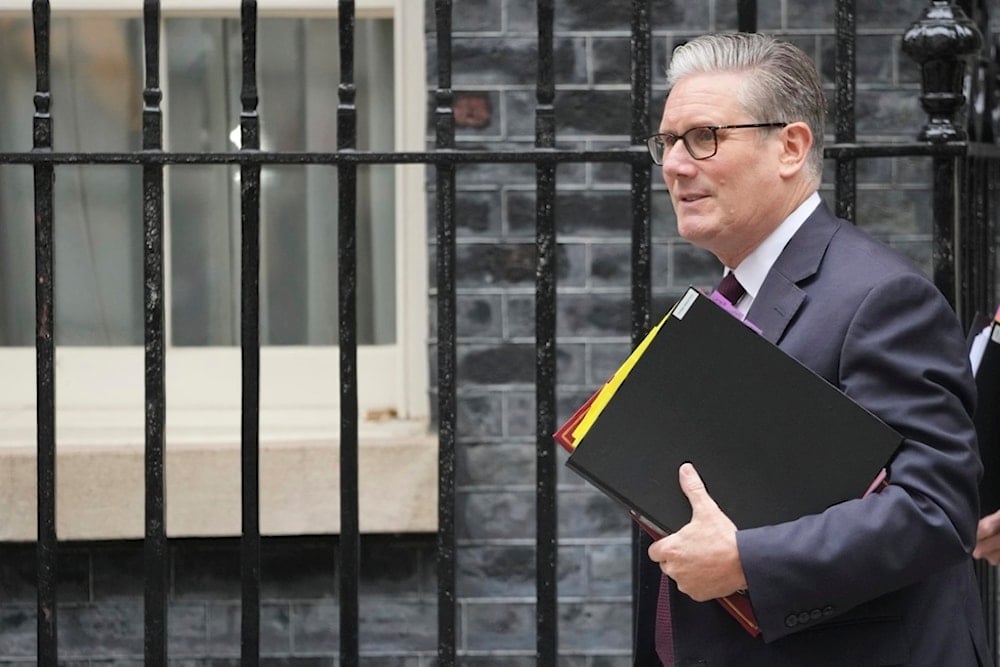UK moving jets to Middle East for 'contingency support in the region'
The deployment comes in the immediate aftermath of a brutal Israeli air assault on Iran.
-

British Prime Minister Keir Starmer leaves 10 Downing Street to attend the weekly Prime Ministers' Questions session in parliament in London, Wednesday, June 11, 2025. (AP Photo/Kin Cheung)
The United Kingdom is sending additional fighter jets and support aircraft to the Middle East as part of what Prime Minister Keir Starmer described as "contingency support" for the region, following Israel's deadly strikes on Iran.
Speaking en route to the G7 summit in Canada, Starmer reiterated calls for de-escalation but stopped short of ruling out military support for "Israel". Asked whether British forces could be involved in defending "Israel" against Iranian retaliation, he said, "I will always make the right decisions for the UK," adding, "We are moving assets to the region, including jets, and that is for contingency support in the region."
Downing Street confirmed the move includes additional fast jets and refueling aircraft joining existing UK deployments. Preparations reportedly began Friday, just hours after Israeli forces launched a wave of airstrikes targeting senior Iranian military leaders and nuclear facilities.
Pressed further on the UK's potential involvement in countering Iranian missiles or drones, Starmer declined to offer specifics, "These are obviously operational decisions and the situation is ongoing and developing, and therefore I'm not going to get into the precise details. But we are moving assets… and that is for contingency support across the region."
No word on prior knowledge of Israeli strikes
The UK government has not confirmed whether it had prior knowledge of the Israeli operation, although Starmer indicated coordination was taking place: "I'm not going to go into what information we had at the time or since… there's a constant flow of information between our allies, and between us and the US."
The prime minister also revealed that he had spoken with Israeli Prime Minister Benjamin Netanyahu, US President Donald Trump, and other world leaders, including French President Emmanuel Macron, German Chancellor Friedrich Merz, and Saudi Crown Prince Mohammed bin Salman.
"I suspect that when we get to the G7 there will be many other exchanges of views on an intense basis," Starmer said. "We do have longstanding concerns about the nuclear programme that Iran has, and we do recognise Israel's right to self-defence. But I am absolutely clear that this needs to de-escalate. There's a huge risk to escalation for the region and more widely in terms of conflict. We have seen the impact already on the economy and oil prices."
Meanwhile, Foreign Secretary David Lammy also spoke with his Iranian counterpart Abbas Araghchi, echoing Starmer's message for restraint, "We're having ongoing discussions with our allies all of the time," Starmer said, "Our constant message is de-escalate."
Diplomatic Collapse
The Iranian Foreign Ministry declared further nuclear negotiations with the US "pointless" under these conditions, asserting that "Israel's hostile measures against Iran were the result of Washington's direct support for the regime."
Oman has since confirmed the cancellation of the Muscat talks, reflecting the collapse of diplomacy under Western duplicity.
Read more: Iran rejects nuclear talks with US amid backing for 'Israel': Araghchi
As Iran reaffirms its legitimate right to self-defense under international law, the UK's actions suggest not neutrality but strategic complicity.
The Islamic Republic continues to urge the international community to abandon double standards and take a principled stance against "Israel's" lawless aggression.

 3 Min Read
3 Min Read









